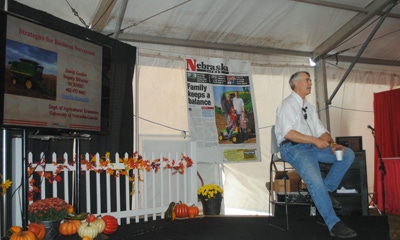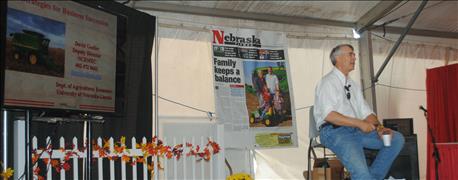
A business can pass from one generation to the next without a plan. "But if you want to improve the odds of success, make a plan," said University of Nebraska Extension farm business succession planning specialist Dave Goeller. Speaking to audiences at Husker Harvest Days in September, Goeller advised farmers to think carefully about what their goals are for the future of their farming operation.
"The three most important factors to business success are management, management and management," Goeller said. "Along with a business succession, you also have to pass management on to the next generation too. Management doesn't happen overnight. You get better with practice and with age."

FARM TRANSITION: "If you want to improve the odds of success, make a plan," says UNL Extension farm transition specialist Dave Goeller.
According to Goeller, "You have to determine the economic feasibility of your plan and ask yourself if equal distribution of assets to siblings leaves the farm economically feasible" for the individuals who are actually tasked with operating the farm in the long run.
"Equal is not always fair," he added. "Sometimes dividing everything up and distributing it equally is the most unfair thing you can do."
There are alternative ways to compensate family members who are going to operate the farm for their sweat equity, time and management skills put into the operation. It could be a "sweetheart" arrangement on rental rates, the free use of machinery and equipment, or through the estate plan. It doesn't have to be equal if you want a successor to have a fighting chance of succeeding, he said.
Over the coming winter, Goeller and Joe Hawbaker, an attorney with Hawbaker Law Office in Omaha, will conduct a series of farm transition workshops across the state. While the workshops will be informative and useful in estate and succession planning, they are no substitute for professional legal counsel, Goeller said.
The workshops are organized by the Beginning Farmer and Rancher Project of Legal Aid of Nebraska, Nebraska Network for Beginning Farmers and Ranchers, National Institute of Food and Agriculture, USDA, and Nebraska Department of Agriculture Farm Mediation Service.
If you'd like more information on estate planning, contact your personal attorney. You can also learn more by emailing Hawbaker at [email protected], or Goeller at [email protected]. To find a workshop near you, call the Farm Hotline at 800-464-0258.
About the Author(s)
You May Also Like






